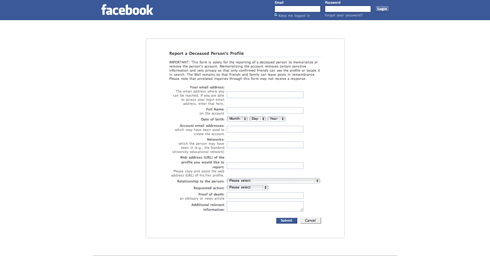That’s Awkward: What Does Facebook Do When a User Dies?
 May was big month for Facebook. The social networking site saw 6.5 million new users in an unexpected age group: people of 65+ years. The number of new members age 65+ was nearly triple what it was a mere year ago, signifying a fast rise in the popularity of the site among senior citizens.
May was big month for Facebook. The social networking site saw 6.5 million new users in an unexpected age group: people of 65+ years. The number of new members age 65+ was nearly triple what it was a mere year ago, signifying a fast rise in the popularity of the site among senior citizens.
But with the rise in the senior citizen demographic came an issue that needs to be dealt with: what to do when a member passes away. So far, the methods of determining if a person is dead are somewhat iffy as they rely mostly upon other users to submit some kind of proof in a very roundabout way that someone has indeed passed away. The system’s flaws register in two very awkward instances: in the first, people are suggested to “reconnect” with a friend who has passed away but their Facebook profile has not been terminated. The result is a shocking experience for many, even being cited as “definitely a little creepy.” In another instance, someone’s Facebook account was deleted after someone submitted an obituary to Facebook employees, claiming that the member in question was dead. When the member found that his account had been deleted, he had trouble finding any page on the site that would help him to get his account back. Apparently, Facebook needs to add an “I’m not dead” section to their help page.

How do you handle digital ghosts?
Facebook is looking to use an algorithm to suggest when a Facebook member may have passed away. Phrases like “rest in peace” and “I miss you” would trigger the algorithm, bringing the profile to the attention of a staff member, who would then set to work investigating the source of the phrases. Of course, family members and friends would have the option of memorializing a profile in remembrance. The person’s personal information would be removed and the profile would become unsearchable, allowing friends and family to grieve in some form of privacy.
While Facebook still has not set forth a plan for dealing with members that have passed away, they are working on finding the best strategy to deal with such delicate situations. {New York Times}
